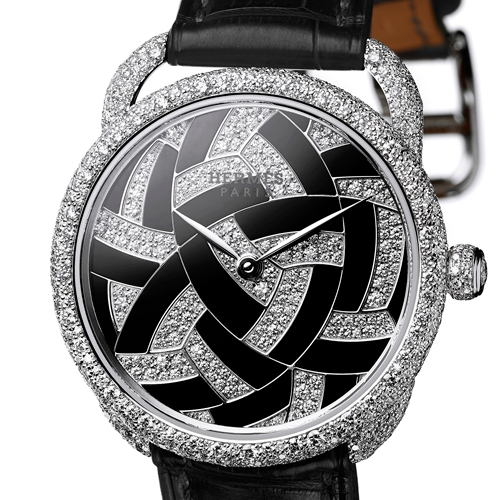
Arceau Temari
Power reserve: 50 h, 28800 vph
The Japanese-inspired Arceau Temari model combines the skills of snow setting and hard stone marquetry in an exceptional collection of jewellery watches.
The story of Temari, an art meaning “hand ball” in Japanese, is bound up with that of kimonos, since the making of these silken garments provided enough scraps of fabric to make these entertaining objects that were greatly appreciated at the Imperial court. Little by little, simple stitching gave way to embroidery and to motifs that were increasingly sophisticate, in terms both their complex geometry and their colourful harmonies.
These ancestral balls have inspired a Hermès silk carré, of which one of the motifs is now reinterpreted in the Arceau collection. These watches are issued in limited white gold editions set with diamonds according to the snow-setting technique and feature dials reproducing the design of one of these balls by combining diamonds with a marquetry composed either of white mother-of-pearl, onyx, lapis lazuli or opal.
The snow-setting is done with no predefined plan; and instead each stone is individually selected and put in place; each claw is cut and each grain is beaded so as to create an harmonious overall effect that is unique to each model. No less than 700 stones are set on the case, a job that takes an experienced gem-setter almost three weeks.
On each of these exceptional watches, the dial is crafted according to traditional diamond-setting and hard stone marquetry techniques. For each watch, and in this case according to a precise plan, 20 tiny fragments of all different shapes and sizes are milled from a block of stone or mother-of-pearl finely sliced into infinitely small platelets. The pieces are then individually assembled on the already gem-set dial. These two operations require great precision and dexterity, since the stone is particularly fragile on such a tiny scale. As if in a miniature puzzle, each part takes its place within a picture that transcends it. The opulence of the materials enter into a fascinating dialogue with the finesse of the motifs, as traditions and expertise meet and mingle to endow each of these unique creations with the refined splendour of Imperial Japan.


